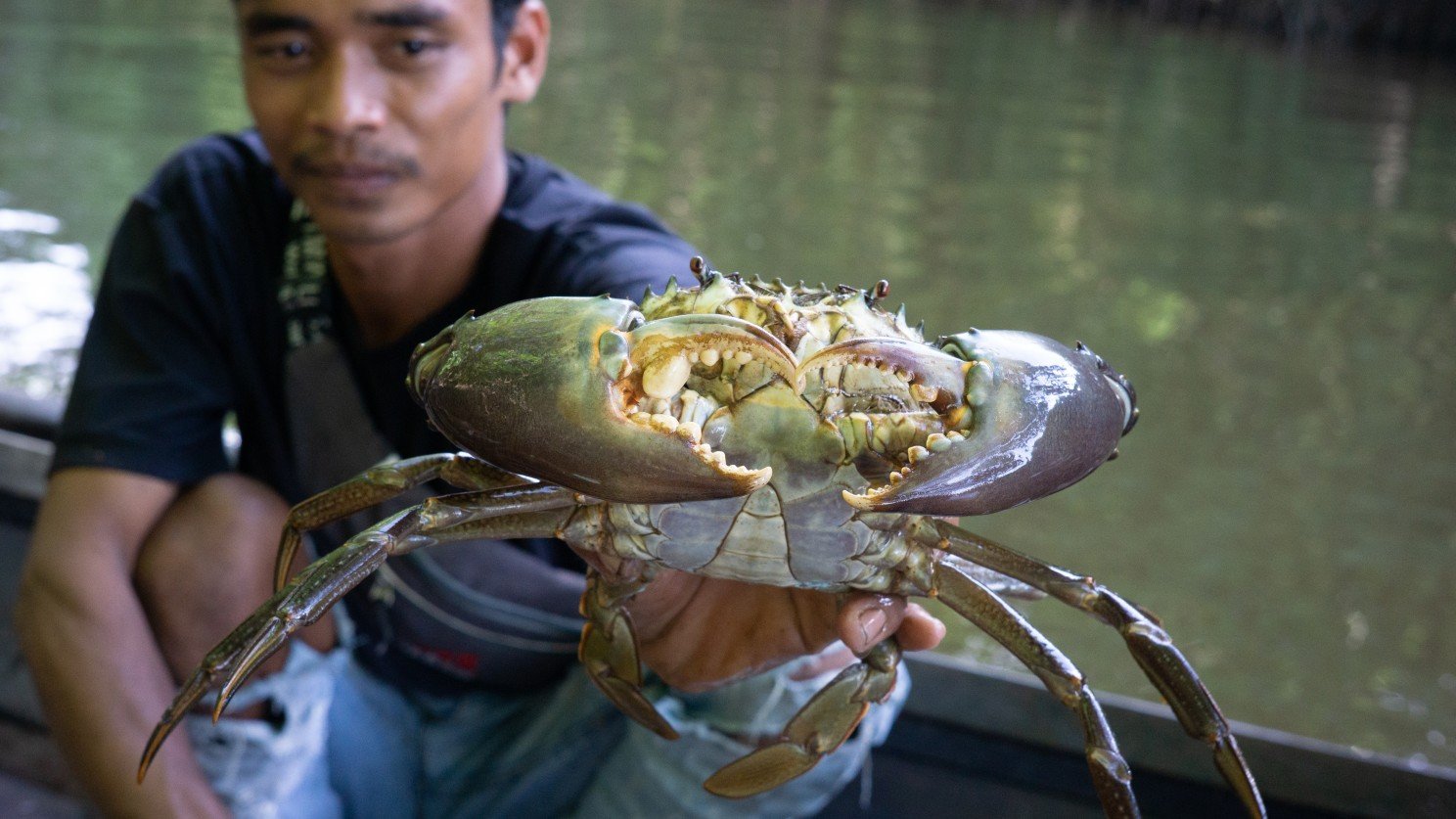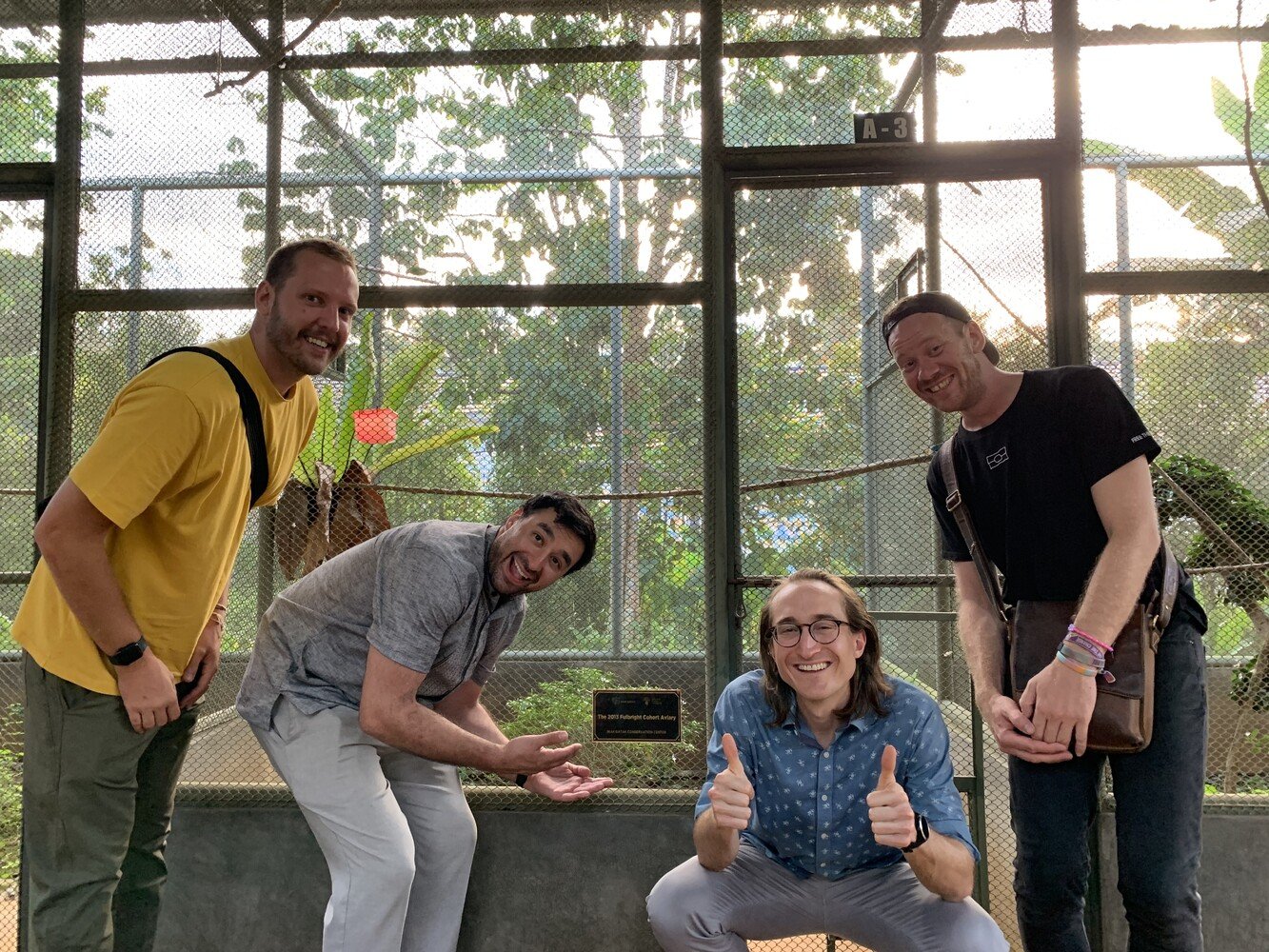How Planet Indonesia is Protecting Nature, Restoring Forests, and Improving Lives
In July, our Board Member Nicholas Hughes joined our team in West Kalimantan. Traveling (on foot, motorbike, by boat, and one very rocky car ride) through the forests and coastal sites of West Kalimantan to spend time with two of our partner communities. Learning more about how their work with Planet Indonesia has changed their lives and the ecosystems they depend on, he documents his observations in this article (first published on Linkedin).
We thank him for his words and dedication to our mission over the past five years.
After serving on the Board of Directors of Planet Indonesia International for the past five years, it was a pleasure to recently visit the team in Pontianak and see first-hand some of the villages we serve around West Kalimantan!
Umbo Village: Stewards of the Rainforest
After arriving in Pontianak on an evening flight, we set out early the next morning to visit Umbo Village, a small community of about 40 households located within the Gunung Nyiut Forest Complex, one of the last remaining primary forest regions along the West Kalimantan – Malaysian border.
Umbo's "Main Street"
Umbo is about a 6-hour total drive from Pontianak, including the last few miles along an unpaved road that is a bumpy ride when it’s dry and extremely treacherous to traverse during the rainy season. All along the journey, while Planet Indonesia Co-Founder Novia Sagita gave us a crash course on how to drive fast on rural Indonesian roads, we passed trucks filled with palm fruit bound for manufacturing centers to be processed into palm oil.
Seeing firsthand how the roots of the palm oil supply chain are embedded so deeply within rural communities was a stark reminder of how challenging it will be to reduce this highly productive crop’s environmental impact. The global economy’s insatiable demand for palm oil is a major driver of deforestation in Indonesia, but the equation for deciding what to do about this is not as straightforward as you might think (I like this article’s data-driven approach to explaining the complexity of the topic).
Palm oil trucks are a familiar site in Kalimantan
The residents of Umbo are Dayak, one of the hundreds of indigenous groups native to Indonesia, and their ancestors have called the forests of Gunung Nyiut home for generations. However, due to influence from illegal wildlife traders and large palm oil and mining corporations, most of the economic incentives for villages like Umbo have historically pushed residents towards extractive subsistence strategies like poaching, illegal logging, or selling rights to their land to faceless corporations. This trend is a familiar story across Indonesia, and it precipitates a cycle of rural poverty that leads to poor outcomes for both indigenous peoples and the precious natural environments they inhabit.
Planet Indonesia’s model aims to break this cycle and improve livelihoods in a manner that is equitable and harmonious with nature. The residents of Umbo, who we have been working with since 2018, offer a powerful testimonial of the impact that a community-led conservation approach can bring. This was on full display during the listening session we held the evening we stayed there. Several dozen community members attended to discuss how working with Planet Indonesia has benefited them and to share what challenges they still face as a community.
Brushing up on our Bahasa Indonesia with Umbo residents
Late into the night, they generously shared their experiences (as they did their home-brewed rice whiskey) with Planet Indonesia’s model: how the climate-smart agriculture initiative has helped them improve crop yields while reducing deforestation; how the savings and loans fund provides them with access to low-interest capital; and how the health and education programs have helped mitigate their isolation from medical and educational facilities due to the poor condition of their village’s road. They were particularly proud of their itama honey bee apiary, which Planet Indonesia helped them build by rehoming a dying bee hive from the forest and is now providing a valuable source of income for the village. I was delighted to return home with some of the delicious honey!
Planet Indonesia works with twelve villages like Umbo in the Gunung Nyiut area, and the impact of our approach is being felt across the region. Since we began working there in 2015, we have seen a 77% reduction in forest loss and an increase in aboveground carbon sequestration, coupled with improved health, social, and economic outcomes for vulnerable indigenous communities (you can read the latest about Planet Indonesia’s impact in our 2022 Annual Report).
The Planet Indonesia team with Umbo residents in front of a traditional Dayak house
When darkness fell, the villagers powered on a diesel generator to supply electricity to the main part of their village, which got me thinking about energy access. They shared how fuel is a major expense for the village, but since Umbo – like many other remote villages across Indonesia – is not connected to the national electricity grid, the generator is their only power option. The next morning, we took a short hike to the nearest rapids on the river that runs through their village, where village leaders have explored installing a micro-hydropower system. The rapids produce enough energy to supply clean electricity to the village, but although other similar communities in rural Kalimantan have successfully built micro-hydropower facilities, for Umbo the estimated $100K in required start-up capital is a prohibitive barrier.
Indonesia’s electricity generation is dominated by coal and natural gas, but the country has tremendous renewable energy generation potential, particularly for photovoltaic solar. The national utility’s 10-year business plan published in 2021 comprised over 50% renewable energy projects for the first time ever, which holds global significance since Indonesia’s emissions trajectory will play a huge role in the world’s push towards net zero emissions. Isolated communities like Umbo are prime examples of the impact that distributed solar or other small-scale renewable energy projects could have for millions around the world.
Sungai Nibung Village: Sustainable Coastal Livelihoods
The following day, we hopped on a speedboat to Sungai Nibung, one of the coastal village sites Planet Indonesia works with within the Kubu Raya Mangrove Forest. It was a 1.5-hour boat ride through gorgeous wetlands that showcased the beauty of mangrove ecosystems. Mangroves are bulwarks in the fight against climate change and are critical ecosystems for the livelihoods of coastal communities like Sungai Nibung. Their dense canopies serve as protective shelters for the breeding habits of many coastal species, their root systems help protect against storm surge, and their carbon sequestration abilities make them crucial carbon sinks.
Mangroves: nature's secret weapon
Although the mangroves of Kubu Raya are relatively well-preserved (in other parts of Indonesia, mangrove forests have been completely clear-cut to make room for shrimp farms), we did pass by a few villages that Planet Indonesia’s Co-Founder Adam Miller pointed out had sold access to their lands for mass aquaculture and palm oil cultivation. The villagers of Sungai Nibung, however, have maintained or restored over 70% of their 5000 hectares as mangrove forests by adopting the mantra “If you cut down a mangrove tree, you must replace it with ten seeds.” During our tour of the village, we visited a grove of Rhizophora mangroves that were planted 4 years ago in a site that was previously a shrimp pond. The trees are already 4+ meters high!
Mudcrabs provide a major income source for Sungai Nibung villagers
Sungai Nibung has implemented an active fisheries management approach to protect their natural resources, including twice-annual fisheries closures to allow shrimp, mud crab, and fish populations to replenish. They, as well as several other nearby villages, have also instituted permanent community-based no-take zones, which protect the fragile breeding grounds of many of the flagship species that are critical to their livelihoods.
Analysis of mudcrab population data in the Kubu Raya district indicate a statistically significant 29% increase in populations through community-based management since we started working with villages there in 2017. Sungai Nibung residents have also been exemplary participants in Planet Indonesia’s education initiatives. Over 100 villagers have participated in our literacy programs and gone on to earn their high school-equivalent degree. Like Umbo, Sungai Nibung is isolated, with the nearest high school a 40-minute boat ride away (they are working on building their own school).
We had a wonderful afternoon at Sungai Nibung and were able to enjoy some of their fresh seafood for lunch. When I saw a solar panel on a nearby building, my mind once again went to energy access, and I asked the village leader about how they get electricity. He shared that they currently rely on diesel generators for power, but a few years back had purchased some solar panels that had since been abandoned due to battery cost and maintenance challenges. This negative perception of solar energy as expensive and unreliable is apparently not unique to Sungai Nibung, and could be a barrier to solar uptake in rural areas in Indonesia. The health benefits and potential cost savings of switching away from fossil fuel combustion should provide plenty of incentive for communities like Sungai Nibung to consider switching to clean energy sources, but the Indonesian government will need to make significant investments to sustainably scale renewables in rural areas. Given the track record of impact, we have with our partner villages, perhaps Planet Indonesia will have a role to play in getting communities on board as well.
Visiting a mangrove nursery at Sungai Nibung
Pontianak: Planet Indonesia's Impact Headquarters
During our last day in Pontianak, we had the pleasure of visiting Planet Indonesia’s offices and meeting a large portion of our brilliant 85+ person team. My fellow board member Maxwell Bevilacqua led a negotiation training with the senior leadership team, which focused on how to re-frame negotiations with villages, government officials, and NGO partners to drive greater value realization for all parties involved. That evening, we also visited Planet Indonesia’s Wak Gatak Songbird Rescue Center, a first-of-its-kind institution in Indonesia dedicated to rehabilitating birds that have fallen victim to the illegal wildlife trade back into the wild. Unfortunately, a huge demand for rare songbirds across Asia fuels a black market that traffics millions of birds each year. While Planet Indonesia’s core model aims to address the root causes of poaching in rural communities, the rescue center is a critical facility to help return captured birds to the wild and prevent the spread of devastating avian diseases. Our visit to the center was another inspiring example of how Planet Indonesia’s holistic approach is helping mitigate and reverse the multiple environmental crises at play in the country.
A few former Fulbrighters in front of the 2013 Fulbright Cohort Aviary at Planet Indonesia's Wak Gatak Songbird Rescue Center
How to Get Involved!
As I have reflected back on my trip while writing this article, I have been continuously overcome with feelings of gratitude. I am grateful for the hospitality extended to me by my new friends in Umbo and Sungai Nibung villages, and for the hard work they (and many other indigenous groups around the world) are putting in to preserve Earth’s precious natural resources. I am grateful for the amazing team at Planet Indonesia working to drive equitable and sustainable change in our partner communities, and honored to be able to play a small part in this work. Most of all, I am grateful for the comfortable life I am privileged to live as an American, and committed to using my time, skills, and perspective to help build a better and greener world.
After witnessing Planet Indonesia’s programs in person, I am all the more energized by the impact our model is having in some of the world’s most critical ecosystems. If you’ve read this far and are inspired as well, there are many ways you can get involved and help support our work:
Donate! We leverage every dollar we raise with a dedication to maximizing impact and transparency.
Talk to your representatives. Call, email, speak to them at public meetings, and make your voice and interests heard. Remind them that protecting rainforests and supporting indigenous community land management are critical solutions to climate change, biodiversity loss, and reducing poverty. Demand that they make climate and environmental action a priority. Find and contact your local representative today using this database.
Make sure your palm oil is sustainable. It’s in your chocolate. Your ice cream. Your detergent. Even your pet’s food. Palm oil is an edible vegetable oil consumed all over the world, appearing in nearly 50% of household products in the United States. Indonesia and Malaysia make up over 85% of global supply, and orangutans, tigers, and other wildlife are threatened by non-sustainable palm oil production in Indonesia. Consider supporting these companies who have taken action to clean up their palm oil supply chain to deliver deforestation-free palm oil and advance respect for human rights.
Choose environmentally sustainable seafood. Knowing the details of how and where your seafood is harvested is key to protecting our ocean and ensuring a long-term supply of seafood. Seafood Watch uses scientific research, government reports, and information from fishery and fish farm experts to help you choose what to buy and what to avoid.
Support climate-conscious brands and companies, particularly those who have set science-based emission reduction targets and are dedicated to indigenous rights and equity. As You Sow’s Clean 200 list offers a good place to start.
Normalize the climate conversation. Talk to your friends, family and colleagues about the realities of climate change and what they can do to help. Count Us In provides some helpful guidance for doing this.
Get outside and volunteer in your local community! Clean up a trail, pick up trash, or help address whatever environmental problems are common in your area. Bonus points if you bring friends or colleagues!









